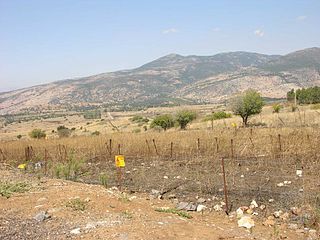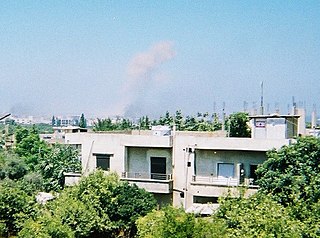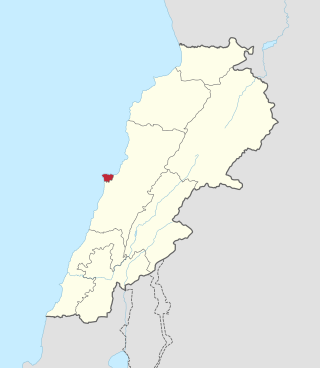| |||||
| Decades: | |||||
|---|---|---|---|---|---|
| See also: | |||||
The following lists some remarkable events that happened in 2014 in Lebanon on a monthly basis.
| |||||
| Decades: | |||||
|---|---|---|---|---|---|
| See also: | |||||
The following lists some remarkable events that happened in 2014 in Lebanon on a monthly basis.
This is a timeline of events related to the 2006 Lebanon War.
The Israeli–Lebanese conflict, or the South Lebanon conflict, is a long-running conflict involving Israel, Lebanon-based paramilitary groups, and sometimes Syria. The conflict peaked during the Lebanese Civil War. In response to Palestinian attacks from Lebanon, Israel invaded the country in 1978 and again in 1982. After this it occupied southern Lebanon until 2000, while fighting a guerrilla conflict against Shia paramilitaries. After Israel's withdrawal, Hezbollah attacks sparked the 2006 Lebanon War. A new period of conflict began in 2023, leading to the 2024 Israeli invasion of Lebanon.

The 2000–2006 Shebaa Farms conflict was a low-level border conflict between Israel and Hezbollah for control of Shebaa Farms, a disputed territory located on the Golan Heights–Lebanon border. Fighting between the two sides primarily consisted of Hezbollah rocket and mortar attacks on Israel and Israeli artillery barrages and airstrikes on Hezbollah in southern Lebanon. Clashes began a few months after the 2000 Israeli withdrawal from Lebanon, which Hezbollah viewed as incomplete due to the presence of the Israel Defense Forces in Shebaa Farms. The conflict culminated in the 2006 Lebanon War; Israel retains control over the territory.

The 2007 Lebanon conflict began when fighting broke out between Fatah al-Islam, an Islamist militant organization, and the Lebanese Armed Forces (LAF) on May 20, 2007 in Nahr al-Bared, a UNRWA Palestinian refugee camp near Tripoli.

The Abdullah Azzam Brigades, or al-Qaeda in Lebanon, was a Sunni Islamist militant group, and al-Qaeda's branch in Lebanon. The group, which began operating in 2009, was founded by Saudi Saleh Al-Qaraawi and has networks in various countries, mainly in Egypt, Iraq, Syria, Jordan, the Gaza Strip and Lebanon.

The Bab al-Tabbaneh–Jabal Mohsen conflict was a recurring conflict between the Sunni Muslim residents of the Bab-al-Tabbaneh neighbourhood and the Alawite residents of the Jabal Mohsen neighbourhood of Tripoli, Lebanon from 1976 through 2015. Residents of the two neighbourhoods became rivals during the Lebanese Civil War and frequently engaged in violence. Residents were divided along sectarian lines and by their opposition to or support of the Alawite-led Syrian government. Violence flared up during the Syrian Civil War spillover in Lebanon.

Between 2011 and 2017, fighting from the Syrian civil war spilled over into Lebanon as opponents and supporters of the Syrian Arab Republic traveled to Lebanon to fight and attack each other on Lebanese soil. The Syrian conflict stoked a resurgence of sectarian violence in Lebanon, with many of Lebanon's Sunni Muslims supporting the rebels in Syria, while many of Lebanon's Shi'a Muslims supporting the Ba'athist government of Bashar Al-Assad, whose Alawite minority is usually described as a heterodox offshoot of Shi'ism. Killings, unrest and sectarian kidnappings across Lebanon resulted.
The Lebanese–Syrian border clashes were a series of clashes on the Lebanon–Syria border caused by the ongoing Syrian Civil War.
On 9 July 2013 the southern suburb of Beirut, Bir el-Abed was hit by a car bomb. The bombing injured at least 53 people, as it was close to a supermarket which was heavily packed in preparation for Ramadan, but did not claim any lives. The bombing increased fear amongst the Lebanese people that the war in Syria was close to entering Lebanese territory. This bombing took place in the heart of Lebanon's Hezbollah militant group's primary location. This group is a Shia Islamist political party known for supporting, and fighting alongside President Bashar al-Assad in Syria's civil war; leading people to believe that the bombing was intentional, and intending to relay a message to those it targeted.

The 2013 Iranian embassy bombing in Beirut was a double suicide bombing in front of the Iranian embassy in Beirut, Lebanon on 19 November 2013. The two bombings resulted in 23 deaths and injured at least 160 others.

The Qalamoun offensive (2014) was launched by the Syrian Army, in coordination with the Lebanese militia Hezbollah, during the Syrian Civil War against remnant rebel forces following the previous Battle of Qalamoun which resulted in the military securing all of the towns in the region.
On 2 August 2014, after Lebanese security forces arrested an al-Nusra Front commander, fighters from al-Nusra Front and ISIL surrounded Lebanese Army checkpoints in Arsal before attacking them and storming the northeastern town's police station, where they took at least 16 policemen hostage. The militants then proceeded to take control of the town, and captured two soldiers who were freed by the military later in the day. The fighting continued into the next day and left 30 militants, 10 soldiers and two civilians dead. 25 soldiers were wounded and 13 were missing and presumed captured. Two of the missing soldiers were rescued the same day.
From its inception, the Syrian Civil War has produced and inspired a great deal of strife and unrest in the nation of Lebanon. Prior to the Battle of Arsal in August 2014, the Lebanese Army has tried to keep out of it and the violence has been mostly between various factions within the country and overt Syrian involvement has been limited to airstrikes and occasional accidental incursions.
From its inception, the Syrian Civil War has produced and inspired a great deal of strife and unrest in the nation of Lebanon. Prior to the Battle of Arsal in August 2014, the Lebanese Army has tried to keep out of it and the violence has been mostly between various factions within the country and overt Syrian involvement has been limited to airstrikes and occasional accidental incursions. Since then, the Lebanese armed forces have taken a major part in the frey within Lebanon, and there have been jihadist attempts at invasion which have been repulsed by both the Army and Hezbullah.
The North Lebanon clashes were a conflict that occurred in October 2014, between the Lebanese Army and Islamist militants in the area of North Lebanon, being also part of the Syrian Civil War spillover in Lebanon.
The following lists events that happened in 2015 in the Lebanese Republic.
The following lists events that happened in 2007 in Lebanon.

Evidence of settlement in Tripoli dates back as early as 1400 BCE. Tripoli was originally a Phoenician colony. In the 9th century, the Phoenicians established a trading station in Tripoli and later, under Persian rule, the city became the center of a confederation of the Phoenician city-states of Sidon, Tyre, and Arados Island. Under Hellenistic rule, Tripoli was used as a naval shipyard and the city enjoyed a period of autonomy. It came under Roman rule around 64 BCE. The 551 Beirut earthquake and tsunami destroyed the Byzantine city of Tripoli along with other Mediterranean coastal cities.